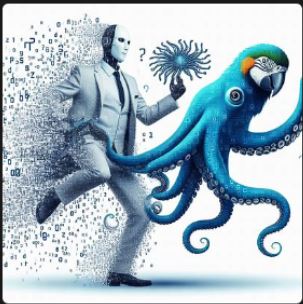Stochastic Parrots, Policies, Octopi Who Pretend to Be Human, & Dancing Robots
DOI:
https://doi.org/10.14288/jaaacs.v16i1.198579Keywords:
stochastic parrots, data, algorithms, politics of knowledge, Afrofuturism, artificial intelligence (AI), Chatbots, Educational Policy, More-than-Human, Synthetic GovernanceAbstract
Amid hysteria over chatbots, image creators, and other AI encroachment, it is imperative to deal with data and algorithms taking on seemingly irreversible deterministic roles in educational policy, evaluation, and curriculum development. A lens of synthetic governance leads the focus from hyper-humanism to Afrofuturism. Finally, if we become more like the machines that we created in our image in a perpetually reinforcing cycle, then we can alternatively imagine new relationships by studying the very different relationships demonstrated by trees and oceans, plants, and other more-than-human beings on our planet.
Downloads
Published
2024-02-21 — Updated on 2024-02-21
Issue
Section
Articles


